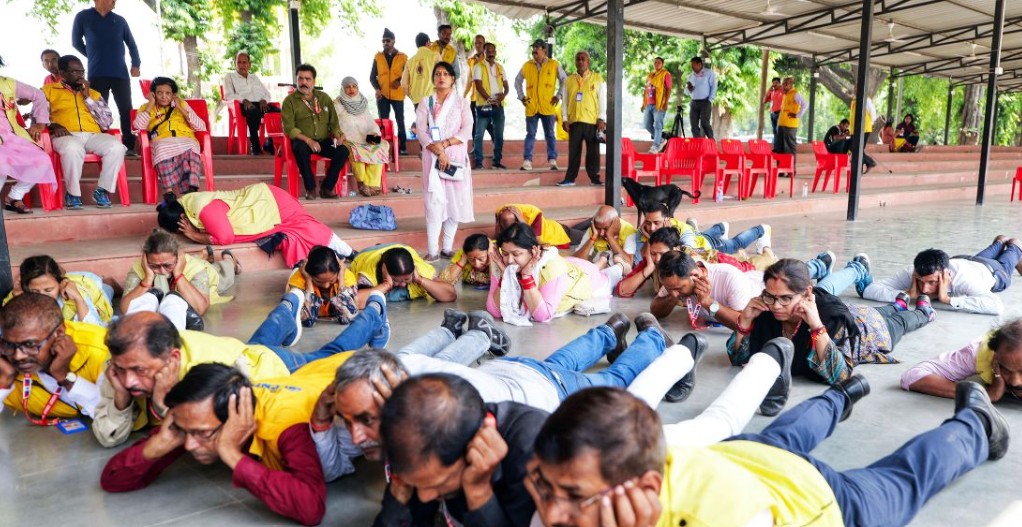A significant, comprehensive civil defence mock drill, meticulously planned to bolster emergency preparedness across India’s western border regions, has seen an unexpected postponement in several states and Union Territories. While the broader exercise, known as ‘Operation Shield,’ was initially slated to be conducted on Thursday, May 29, 2025, across regions like Jammu and Kashmir, Haryana, Rajasthan, Gujarat, and Chandigarh, a late directive from the Union Home Ministry led to its deferral. Amidst this widespread rescheduling, Punjab has emerged with a clear path forward, officially proposing and subsequently securing approval to conduct its crucial part of the drill on Monday, June 3, 2025. This decision underscores Punjab’s proactive stance in strengthening its civil defence mechanisms, even as its counterparts await new dates for their respective exercises.
‘Operation Shield’ was conceived as a critical, multi-faceted exercise designed to simulate real-world threats such as air raids, drone incursions, and missile attacks, thereby assessing and enhancing the readiness of districts particularly vulnerable due to their proximity to the international border. The drill’s objectives included testing the efficiency of existing response mechanisms, ensuring seamless coordination among various agencies, and, crucially, educating the civilian population on immediate protective measures. This typically involves the activation of centrally controlled air raid sirens, implementation of complete blackout procedures in civilian areas, and the practical execution of civilian evacuation protocols, especially near sensitive installations and military stations. These exercises are an indispensable component of national security preparedness, gaining heightened significance in the wake of recent geopolitical tensions and cross-border incidents.
The imperative for such robust drills intensified significantly following ‘Operation Sindoor,’ a retaliatory strike conducted by India on May 7, 2025. This operation targeted terror camps in Pakistan-Occupied Kashmir (PoK) in response to a brutal terror attack in Pahalgam on April 22, which tragically claimed 26 lives. The days succeeding ‘Operation Sindoor’ witnessed a period of heightened cross-border exchanges, including missile strikes and numerous drone incursions, though these were effectively thwarted by Indian air defence systems. These volatile developments starkly highlighted the critical need for well-rehearsed civil defence protocols and for civilian populations in border areas, such as those in and around Pathankot, to be acutely aware and prepared for potential hostilities. A prior civil defence exercise, ‘Operation Abhyas,’ conducted earlier in May, had reportedly identified certain gaps in preparedness, providing further impetus for the more comprehensive and widespread ‘Operation Shield.’

The abrupt postponement announcement, disseminated just hours before the scheduled drill on May 29, initially led to some confusion among the public and the myriad agencies poised to participate. Official statements from the Home Departments of Rajasthan, Gujarat, and Haryana swiftly confirmed the deferment, citing “administrative reasons” and assuring that new dates would be announced in due course. The Chandigarh administration also issued a similar directive, clearly stating that there would be “no blackout or mock drill” on the designated day. These rapid communications were vital in dispelling any potential panic or misunderstanding among citizens who had been anticipating the drill’s various measures.
Punjab’s response, however, stood out for its proactive nature. The Punjab government, through its Home Department, had formally communicated with the Centre, proposing June 3, 2025, as an alternative date for conducting its civil defence exercise. This request was rooted in a practical logistical challenge: a significant portion of Punjab’s dedicated civil defence staff and best volunteers were currently engaged in an intensive Training of Trainers (ToT) program being conducted by the National Disaster Response Force (NDRF). A senior Punjab Police officer elucidated that conducting the full-scale exercise without these highly trained personnel would have rendered it less effective. The Centre’s subsequent acceptance of Punjab’s proposal underscores a flexible and collaborative approach to national security preparedness, allowing states to adapt to their specific operational realities while maintaining the core objective of robust civil defence.
The decision to postpone, uniformly attributed to “administrative reasons” across states, reflects a nuanced understanding of the complexities involved in orchestrating such large-scale, multi-agency exercises. It could encompass a range of factors from unforeseen operational commitments of key security forces, the need for further refinement of drill protocols based on evolving intelligence, to ensuring the optimal availability of trained personnel. In Punjab’s case, the deferral explicitly allowed for the integration of newly trained NDRF personnel, ensuring that the drill on June 3 would be executed with enhanced capability and coordination. This strategic pause is not a reduction in vigilance but rather a calculated step towards maximizing the effectiveness of future exercises.
The geopolitical significance of states like Punjab, Rajasthan, and Gujarat, sharing extensive borders with a challenging neighborhood, makes robust civil defence capabilities absolutely critical. Punjab, with its dynamic border landscape and persistent threat of cross-border drone activity, requires perpetual readiness. Rajasthan’s vast desert terrain presents unique challenges for communication and logistics during emergencies. Gujarat, with its vital coastal infrastructure and industrial hubs, faces multifaceted threats. Therefore, the successful and regular conduct of civil defence drills in these regions is paramount for protecting national assets and, more importantly, the lives of their populations.
Even as other states await the rescheduling of ‘Operation Shield,’ Punjab’s commitment to holding its drill on June 3 sets a clear precedent for continuous preparedness. These exercises transcend mere protocol; they are immersive learning experiences that integrate specialized forces, local administration, community volunteers, and a well-informed citizenry. Organizations such as the National Cadet Corps (NCC), National Service Scheme (NSS), Nehru Yuva Kendra Sangathan (NYKS), and Bharat Scouts & Guides play an indispensable role, mobilizing young volunteers to assist civil administration in a wide array of civil defence measures, from air raid warnings and blackout enforcement to crucial rescue operations and providing immediate first aid.
The forthcoming drill in Punjab on June 3 will involve the activation of air raid sirens, a controlled blackout for a brief period near vital installations, and the testing of communication hotlines connected to the Indian Air Force. It will encompass responses to aerial threats, and critically, assess the functionality of control rooms and the efficiency of civil defence services, including warden duties, firefighting, and evacuation planning. This systematic approach, honed through continuous training and learning from previous exercises like ‘Operation Abhyas,’ aims to foster a culture of resilience and immediate response among both the official machinery and the general populace.
In conclusion, while the initial postponement of ‘Operation Shield’ across several western states momentarily paused a critical preparedness exercise, Punjab’s decisive move to reschedule its drill for June 3 underscores a pragmatic and dedicated approach to national security. This individual rescheduling, driven by the imperative to ensure the participation of optimally trained personnel, highlights the dynamic nature of civil defence. It reinforces the message that despite any temporary deferrals, the unwavering commitment to protecting citizens and fortifying border regions remains a top priority, ensuring that India’s strategic states are perpetually ready to face any eventuality with unwavering preparedness.


